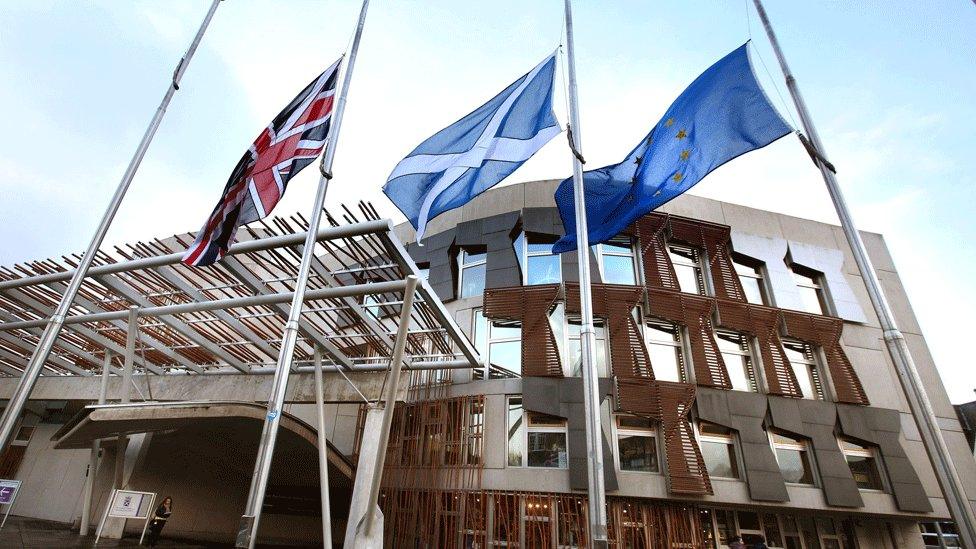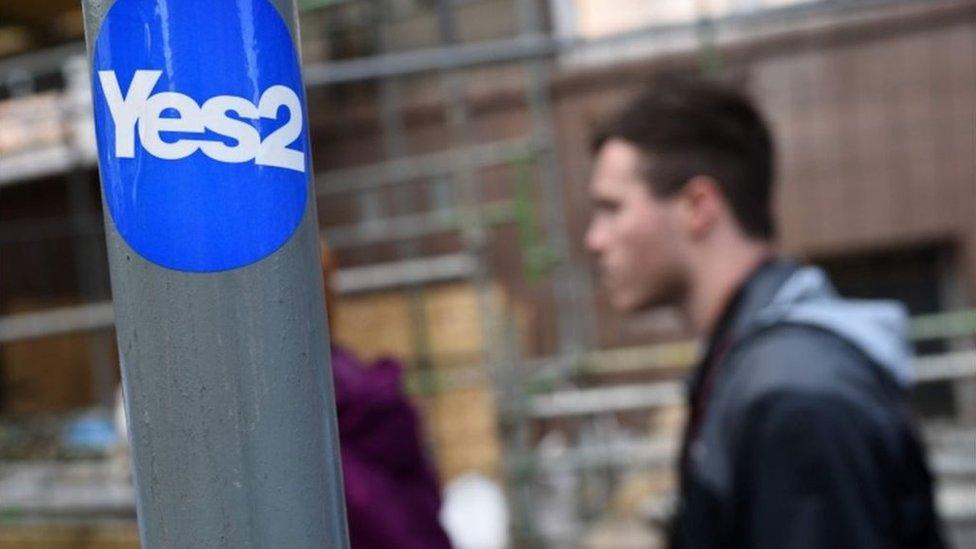Will Brexit be the trigger for indyref2?
- Published

Could Brexit trigger a series of events which sees Scotland leave the UK as well as the EU?
Brexit presents a challenge on many fronts. What will happen to trade? What will happen to the movement of people? What will happen on the island of Ireland?
However, there is also a concomitant conundrum with regard to Scottish independence. And that conundrum is already provoking substantial debate, not least among those who voted Yes in the 2014 Scottish referendum.
That is because Brexit may provide the trigger for indyref2 - but could simultaneously create the electoral environment which results in a second set-back for the independence cause.
The trigger is fairly easy to discern. The people of Scotland voted decisively to remain in the European Union, by 62 per cent to 38.
Hence, it could be argued - it is already being argued, vociferously - that Scotland is being taken out of the EU against the demonstrable will of her people.
I know, I know, the question for the people of Scotland was whether the UK remained in the EU. Not Scotland. I get the concept. However, the preponderance of Scottish opinion, as expressed in that EU referendum, is also a potential factor in the independence debate.
That is partly because those self-same Scottish voters were told during the independence referendum of 2014 that the way to keep Scotland in the EU was to keep Scotland in the UK.
For example, Ruth Davidson made that connection - between the two unions, UK and EU - when she launched the Scottish Conservative European election campaign in May 2014.
She said then that "as part of the UK, Scotland can be part of a new deal that renews our relationship with Europe".
That, she detailed, would include "a better deal for Scottish taxpayers, continued control over our borders, greater control over justice and home affairs and saying No to the Euro."
By contrast, she argued: "None of that will happen if the SNP rip Scotland out of the UK."
Scottish Tory party leader Ruth Davidson says a vote for the party is a vote for the UK to use its weight in Europe to reform the EU
Comparable arguments were delivered throughout the 2014 referendum. Supporters of the union linked independence to European uncertainty: would an independent Scotland be allowed to stay / to join the EU? On what terms?
By contrast, remaining in the United Kingdom was depicted by many unionists as being the avenue for preserving Scottish links with Europe, although Tories also tended to stress the parallel desire for EU reform.
It was part of the "doubt and reassurance" referendum whereby the advocates of union raised question marks about the independence project, while challenging the supporters of independence to provide detailed answers.
So it is absolutely no surprise whatsoever that many in the SNP, many in the independence camp, argue now that Scotland was misled in the run up to the independence vote in September 2014.
That same phenomenon also explains why Nicola Sturgeon said, in the immediate aftermath of the Brexit vote, that a second independence referendum was "highly likely".
As I explain in reports for the wireless and the telly, she followed that up with a formal demand for indyref2 in March 2017.
Nicola Sturgeon said a second independence referendum would be called between autumn 2018 and spring 2019
But now, with a year to go until the Brexit date, where are we? There is now no immediate sign of indyref2. Nicola Sturgeon has put the issue on hold, noting that she intends to revisit the prospect when the Brexit terms are clearer.
All of which raises a range of questions. Firstly, when will those terms be sufficiently clear for indyref2 to be triggered?
Yes, it is a year to Brexit, March 2019. But it has now been agreed that there will be a transition period, lasting until the end of December 2020. Should the decision on indyref2 thus be deferred still further, until at least full-scale Brexit?
Nicola Sturgeon has indicated that the issue might be revisited in the autumn of this year. She signalled that potential timescale when she announced her reset plan in June last year.
But, entirely understandably, she has not committed to a precise date for making a further announcement.
No to Yes - and Yes to No
A second point arises. Even if Brexit is seen as the trigger for independence, would it act as the driver for changing the outcome in a second independence ballot?
That, as you can imagine, is being closely scrutinised and discussed within the SNP, the Scottish government and the wider independence community.
Yes, there may be some who are motivated to move from No to Yes, if perhaps they are sufficiently exasperated by Brexit - or by the fact that Scotland voted to Remain in the EU, and is now due to Leave.
But there may be others heading the other way. If Brexit is made the platform for a renewed independence push, what happens to those citizens who voted Yes in 2014 - but also voted to Leave the EU in 2016?

Every council area in Scotland had a majority for Remain (in yellow) while Leave (in blue) won overall
That prospect helps to explain why there has been a degree of nuance in the most recent statements from the SNP and the Scottish government anent future Scottish membership of the EU.
They tend to talk of reforming Europe, particularly the Common Fisheries Policy. There is associated talk of perhaps joining the EEA, Norway style, at least in the interim. There is precious little evident zeal for full membership of the EU, among those who support independence.
I believe that to be in accord with the thinking of the Scottish people. Yes, they voted by a significant margin to stay in the EU. There was a majority for Remain in every Scottish council area.
But I suspect that support was relatively shallow. I believe it was a choice "on balance", taking account of other aspects. It may in part have been opinion following the stance taken by Scotland's largest party and devolved government.
There are exceptions, of course. There are people in Scotland who are decidedly enthusiastic about EU membership. They regard Brexit as lunacy.
But, mostly, in the round, one finds the most apparent zeal on the other side, among Leavers. Would it be wise to found an independence offer on such a relatively shallow base?

The Brexit process has seen a succession of demands from the Scottish government. For the reversal of Brexit. For Scotland to be given a role at the top table in Brexit negotiations. For UK membership of the single market. Or, failing that, Scottish membership.
Each demand has been, frankly, ignored or sidelined by the UK government which has, mostly, pressed on with its own plan, dealing with internal dissent rather than responding to external pressure from Holyrood ministers.
Has that led, then, to serious and sustained popular pressure for a second independence referendum? Not, I would suggest, at this stage - although it might, of course, yet arise.
The latest conflict has been over in devolved areas like agriculture and fishing. Scottish ministers - the FM, Mike Russell - have fought hard and well over this, garnering widespread support, including from senior politicians who favour the union.
Their aim, they insist, has been elementary fairness. However, they have, entirely understandably, taken every opportunity to argue that Scotland's interests are not being served by unionist politicians.
But has it provoked a full-scale demand for a rethink over the union? Friends, it has not, although - again - such might yet occur.
The scunner factor
The reason this syllogism has yet to develop in full perhaps lies in remarks made by Nicola Sturgeon when she announced the reset in June 2017. Remember this was a tactical repositioning, not a withdrawal. Her referendum bill remained - just not introduced at that point or since.
She said then there were folk in Scotland who never wanted another indy referendum. There were others who wanted one tomorrow.
Then there was a third category - all, she stressed, equally honourable. Those were the anxious. To use a guid Scots word, the scunnered.
Ms Sturgeon noted: "They worry about the uncertainty of Brexit and the lack of any clarity whatsoever about what it means. Some of them just want a break from the pressure of making big political decisions."
That, I believe, is a prime factor. She sees an electorate already worried about the changes which Brexit might involve, the continuing attendant uncertainty, and she declines, for now, to present them with a further big choice: independence.
The decision which confronts her, then, is when/if the anxiety has discernibly lessened, when the scunner factor has sufficiently abated.